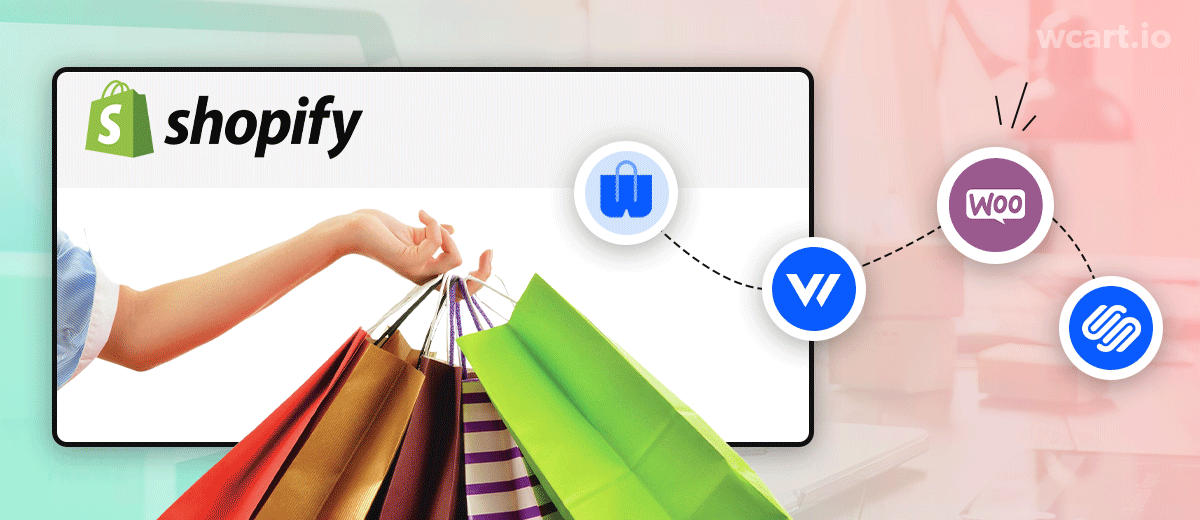After helping 200+ businesses migrate and optimize their ecommerce platforms, our team has learned that Shopify isn’t always the best choice.
While it is popular, that doesn’t necessarily mean it delivers better results for all the business. There are several Shopify alternatives that meet the specific needs of some businesses.
Based on real client implementations, we have identified 7 platforms that outperform Shopify. These recommendations are not theoretical, it’s purely based on tested and hands-on experience.
Below, we share our analysis of the seven best Shopify alternatives, including their key features and real-world costs, to help you make the best decision for your business.
The 7 Best Shopify Alternatives
- Wcart for easy growth and multi vendor marketplaces
- Webnexs for enterprise and omnichannel selling
- BigCommerce for high-volume online stores
- Wix for small businesses and creatives
- WooCommerce for WordPress users and developers
- Squarespace for visual brands and solo entrepreneurs
- Magento for large enterprises
Comparison of Best Shopify Alternatives
| Platform | Best For | Features | Pros |
| Wcart | Growing businesses and multi-vendor marketplaces | Multi-vendor support, advanced inventory, multi-channel integration, integrated POS | Highly customizable, easy setup, built-in marketplace, scalable |
| Webnexs | Large enterprises, businesses needing custom solutions | Headless ecommerce, advanced inventory & order management, multi-store support, B2B features, omnichannel integrations (web, mobile, POS) | Highly customizable, built for scalability, supports multi-channel selling, includes B2B tools out of the box |
| BigCommerce | Fast-growing businesses, high-volume sellers | Built-in SEO tools, multi-currency and multi-language support, no transaction fees, product filtering, API-driven architecture | Scales well with growth, flexible API, strong SEO features, no extra transaction fees |
| Wix | Beginners, small businesses, creative entrepreneurs | Drag-and-drop builder, built-in marketing tools, app marketplace, basic ecommerce tools | Extremely easy to use, great design flexibility, affordable for small stores |
| WooCommerce | Developers & WordPress site owners | Open-source, vast plugin library, customizable checkout, built on WordPress, supports digital/physical goods | Fully customizable, large community, free core plugin, ideal for existing WordPress users |
| Squarespace | Artists, creatives, small product catalogs | Mobile-optimized templates, integrated blogging and email marketing, basic ecommerce tools | Sleek, designer-quality templates, easy for beginners, all-in-one platform |
| Magento (Adobe Commerce) | Large businesses, enterprises with development resources | Advanced B2B capabilities, advanced analytics, custom checkout flows, extensive integrations, scalability for large catalogs | Extremely powerful, highly scalable, built-in B2B support, suitable for complex setups |
1. Wcart – #1 Best Alternative to Shopify

One of the best alternatives to platforms like Shopify is Wcart. It will be like upgrading a high performance SUV, powerful, flexible and built to handle serious growth.
Wcart is built with the purpose of user friendliness plus high customization options. It delivers a rich set of features that are built in. From advanced inventory controls to seamless multi-channel integrations.
It is well known for its customization and multi-vendor features. You can turn a simple store into a multi seller marketplace with just one click. Also you get deep customization options and control over the platform.
It is an all in one solution. Beginner friendly with high customization opportunities. It is easy to set up a website builder. Also it provides a POS integrated with the platform.
Best for
As we said it is an all in one solution. It is best for small to large businesses, niche based platforms, dropshipping and new ecommerce entrepreneurs.
Pros
- Highly customizable and scalable
- Built-in multi-vendor functionality
- Advanced SEO and marketing tools
- 100+ payment gateway integrations
- Abandoned cart recovery
- Cost effective for growing businesses
- 24/7 support with free migration assistance
Con
Requires technical support for advanced customizations
Pricing
Starts at $30/month for Small Store, $89/month for Boutique, $689/month for Super Store.
2. Webnexs – A Shopify alternative for fully customizable and scalable ecommerce

If you feel that Shopify is one-size-fits-all and you are a complex or fast-growing ecommerce business, then it’s worth looking into Webnexs instead.
Think of it as making your custom sandwich versus grabbing one that is ready-to-eat: You get exactly what your business needs, without extras or parts you never touch.
This platform is for larger ecommerce sellers who want deep backend control, highly customized workflows, and omnichannel selling.
It’s particularly powerful for B2B firms, large-scale multi-vendor marketplaces, and companies requiring scalable geolocated infrastructure.
So, unlike Shopify, which relies on third-party apps for configuring most of the features you need to run a store, the default Webnexs setup has flexibility, with native capabilities for inventory management, customer segmentation, and cool things like dynamic pricing.
Best for
Large ecommerce businesses that need custom features, like B2B sellers, multi vendor marketplaces, and fast-growing brands that want full control and sell through multiple channels.
Pros
- Highly adaptable for enterprise use cases
- Supports multiple vendors and omnichannel sales
- Time-saving convenience tools
- Compatible with large volume businesses
- Advanced integrations made easy with flexible APIs
Cons
- Technical knowledge is needed
- Less community resources
- Setup and adjustments may need a developer’s help
Pricing
Custom pricing options, typically based on business size and requirements.
3. BigCommerce – A Shopify alternative for large businesses

If you’re ready to scale your ecommerce business, BigCommerce is a great alternative to Shopify. Picture going from a regular car to a sports car: more power, more bells and whistles, and more room to spread your wings.
It’s built for companies rapidly growing out of a basic ecommerce implementation. It comes with an advanced selection of built-in tools for managing products, processing orders, and driving sales.
With multi-channel selling (including Amazon, eBay and Facebook), you can easily reach customers across different platforms.
You also get powerful marketing features, unlimited product listings, and the ability to grow without relying heavily on third-party plugins.
While it may not be as plug-and-play as simpler platforms, the depth of features rewards those willing to invest a little time learning it. It’s a bit more challenging to learn, and some advanced features are going to require some technical skills. Beyond that, pricing can get a bit steeper, especially as your sales grow and you need higher-tier plans.
However, It is a great option for businesses that anticipate fast growth and need a more customizable, more feature-rich solution.
Best For
Online stores that need more features and rapidly growing one. Also it is very suitable for businesses that want full control over their product pages, how they show up on Google, and to manage more stores at a time.
Pros
- Strong SEO features
- Ideal for large businesses
- Scalable without third party apps
- Advanced inventory and product management features
- Built-in tools for multi-channel selling
Cons
- Higher learning curve, especially for beginners
- Pricing rises as sales increases
- Less customization options
- Limited design flexibility
Pricing
Starts at $29/month for the Standard plan, $79/month for the Plus plan, $299/month for the Pro plan, and custom pricing for businesses with over $1M in online revenue.
Read more: Struggling with BigCommerce? Here are the best BigCommerce alternatives
4. Wix – A Shopify alternative for easy website building with built-in ecommerce

If you are new to running an online business or just want a well-designed site without having to struggle with code.
It is a good alternative to Shopify. It’s like ordering a meal combo: It’s quick, easy, and has everything you need to get up and run.
It is a great choice for small businesses, freelance designers, and designers who don’t mind diving into a template-based design from time to time to keep things looking professional.
For a stylish range of templates, an easy-to-use drag-and-drop builder, and all-in-one plans with hosting, design, and sales tools bundled in, look no further.
Store owners who want to list products, accept payments, and launch basic marketing campaigns can do all of this from an intuitive dashboard.
That being said, it is far from ideal for high-scale ecommerce, with limitations in advanced features like multi-channel selling and complex inventory systems.
However, for small stores or shops that are part-content, part-commerce, it is in the sweet spot between ease of use and functionality.
Best For
Creative people like artists or freelancers who are selling fewer than 50 products and want a simple, stylish store.
Pros
- Easy to use, drag and drop builder
- Professionally designed templates
- All in one(hosting, design, and ecommerce tools)
- Built in SEO and marketing features
Cons
- Limited scalability
- Less flexible for large enterprises
- No advanced ecommerce features
- App marketplace is smaller
Pricing
Pricing starts at $27/month, with custom options for enterprises.
Read more: Struggling with Wix? Here are the best Wix alternatives
5. WooCommerce – A Shopify alternative for WordPress users

If you adore the versatility of WordPress and would like complete supremacy of your online store, WooCommerce is among the best Shopify alternatives. Think of it like creating your own custom workspace.
It is a free, open-source plugin for WordPress that transforms your website into a fully functioning and manageable eCommerce store.
It’s highly customizable, so it’s great for store owners who want to tweak everything from product pages to checkout pages.
You’ll find thousands of themes and plugins available, so you can add whatever your store needs, like advanced shipping rules, a subscription model, or multilingual support.
That being said, WooCommerce still has higher responsibilities. You’ll have to take care of hosting, updates, and security on your own (or pay someone else to).
It’s also a bit more technical to use than a plug-and-play platform such as Shopify or Wix.
That said, if you’re a user who wants customization, control, and WordPress firepower, it provides.
Best For
Stores that are built on WordPress, especially if they focus on content and have a developer to help with setup and changes.
Pros
- Free and open-source
- Fully customizable with thousands of plugins and themes
- Seamless integration with WordPress
- Strong community and developer support
- Great for SEO and content-driven sites
Cons
- Requires separate hosting and setup
- Can be technical and time-consuming to manage
- No official support unless you pay for extensions or use managed hosting
- Performance and scalability depend on your hosting quality
Pricing
Free core plugin, overall costs depend on hosting and paid extensions.
Read more: Struggling with WooCommerce? Here are the best WooCommerce alternatives
6. SquareSpace – A Shopify alternative for beginners

If you’re looking for a gorgeous website with ecommerce being more of a side dish than the main course, Squarespace is a beautiful Shopify alternative to consider.
Consider it like a gallery wall: beautifully designed, thoughtfully arranged with low maintenance.
It’s most popular for its award-winning templates and professionally designed tools, a hit with artists, photographers, bloggers, and online stores.
It provides ecommerce capabilities baked in for selling products, digital downloads, or services, including hosting, design, and analytics all in one clean interface.
That said, it’s not designed for high-volume or complex ecommerce. It lacks robust inventory tools, deep customization, or multichannel selling functionality like Shopify and BigCommerce.
It’s a solid option for sellers with a small inventory who want their brand to appear professional with minimal involvement.
If you’re into content creation, visual branding, or a service-based product with a light ecommerce layer, it’s a very tough act to beat.
Best For
Creative people who want to show their work online, like photographers, bloggers, or designers with small stores.
Pros
- Professionally designed templates
- Easy to use with built-in hosting and content tools
- Ideal for creatives, bloggers, and service providers
- All-in-one solution with analytics and marketing tools
- Seamless experience from design to checkout
Cons
- Limited ecommerce features for larger stores
- Limited multi-channel selling when compared to others
- Less customizable than open-source platforms
- Fewer third-party apps and extensions
Pricing
Pricing starts at $16/month for personal plans, with higher options for commerce features
Read more: Struggling with Sqaurespace? Here are the best Squarespace alternatives
7. Magento(AdobeCommerce) – A Shopify alternative for large stores with complex ecommerce needs

If you’re a large seller with complex requirements, Magento is one of the most powerful Shopify alternatives.
Think of it like building your shop from the ground up with industrial-grade tools, high effort, but unmatched control.
It’s built for developers and enterprises needing a feature-rich platform with custom stores, international sales, dynamic pricing, and advanced product catalogs. Perfect for high-traffic stores with extensive inventories.
That power comes with a steep learning curve and requires a developer or team to manage installation and maintenance.
Hosting and security are your responsibility unless you choose the more expensive Adobe Commerce Cloud.
For large enterprises with their own dev teams, Magento’s flexibility is hard to beat compared to hosted platforms like Shopify.
Best For
Big businesses with complex operations that sell a lot of products, especially global brands with 10,000+ SKUs.
Pros
- Extremely powerful and fully customizable
- Ideal for enterprise-level and high-volume stores
- Supports advanced features like multi-store, multi-language, and dynamic pricing
- Open-source with a strong developer community
- Scales well with the right hosting and resources
Cons
- Requires technical expertise and ongoing development
- High setup and maintenance costs
- Self-hosted version demands strong infrastructure
- Overkill for small or beginner stores
Pricing
Free open-source version, the enterprise solution has custom, high-tier pricing.
Read more: Struggling with Magento? Here are the best Magento alternatives
Which Shopify Alternative Best Fits Your Business Needs?
When selecting a Shopify alternative, it’s important to look into your business’s unique needs and long term goals. Are you a first-time seller looking for a simple, no-code setup? Or a growing brand that needs advanced features like multi-channel selling and custom workflows?
Here’s a quick decision-making checklist to guide your choice:
- Ease of Use vs Customization: Do you need a plug-and-play solution or deep control over design and features?
- Budget: Consider both upfront setup costs and ongoing expenses.
- Scalability: Think about future needs like larger inventories or marketplace integrations.
- Technical Support: Do you have a development team, or will you need hands-on support?
Still unsure? Book a free consultation with our experts to match your needs with the perfect platform.




Leave a Reply